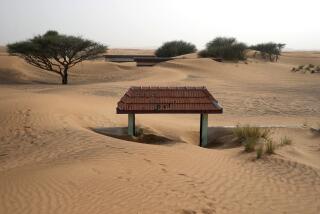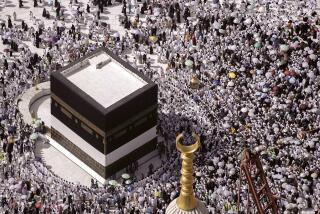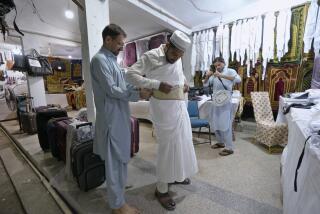Conservative Neighbors Are a Boon to Bahrain
- Share via
MANAMA, Bahrain — Traffic is crawling bumper-to-bumper across the King Fahd Causeway from Saudi Arabia. Bars and restaurants are busily setting tables, putting beer on ice and checking sound systems.
It’s the weekend, and Bahrain is cashing in on its niche in the Persian Gulf tourist market.
Visitors are not drawn to Bahrain by natural beauty or historic sites, but by a social climate far more relaxed than in the island’s conservative neighbors. Liquor is sold at bars, nightclubs and stores, and socializing openly between the sexes is unrestricted.
Thanks to the 15-mile causeway that links Bahrain to oil-rich Saudi Arabia, it has become a close-to-home escape for a region dominated by strict Muslim traditions.
“It’s a great place to get away from everything. There’s a great social atmosphere . . . and people are very friendly,” says Jassim, a 25-year-old Saudi who often drives to Bahrain on weekends. Sipping his sixth can of Foster’s beer, Jassim asks that only his first name be used.
It’s not just Saudis who come. Other visitors are from Kuwait, Qatar, Oman and the United Arab Emirates. Westerners who work in Gulf nations--oilmen, diplomats and business people--also use the island for a getaway.
With a long history as a trading outpost and a British colony until 1971, Bahrain has always been more open to other cultures and more relaxed socially than its insular neighbors. And conservatism never took root because of a very strong leftist movement in the 1940s and ‘50s.
*
Saudi Arabia’s conservative leaders don’t comment on the goings-on offshore, seeing Bahrain as a social safety valve. Saudis who travel to Manama, and elsewhere in the world, can indulge without worry in behavior deemed to be vices back home--as long as they keep a low profile. Bahrain helps out by making it illegal to take photographs inside its bars and nightclubs.
The result is a tourism business that brings in about $450 million a year, or about 9% of the island’s economic activity. With its oil fields expected to run dry by 2000, Bahrain also has built up a regional banking industry and is trying to develop manufacturing as well.
The King Fahd Causeway, named for the Saudi monarch, proved a major boost to tourism when it opened in 1986, says Kadhim Rajab, assistant undersecretary for tourism affairs.
Just fewer than 100,000 people used the causeway the first year, but now more than 2 million visitors drive onto the island annually, he says. More than 60% of the 2.7 million tourists in 1996 were from Saudi Arabia.
Since the causeway opened, more than 20 hotels have been built, putting the total number at 62, seven of them luxury five-star hotels. Rajab says more are planned.
There have been snags. Tourism is down slightly from a peak in 1994, when Shiite Muslims began a campaign of violence to press demands for democratic reform and a greater economic role. Shiites are a slight majority among Bahrainis, but the royal family is from Islam’s Sunni sect.
The insurgency, which resulted in more than 40 deaths, included several small bombings at hotels and restaurants.
But Nicholas van Marken, an expert on the leisure business for Arthur Andersen consultants, says tourism has been rebounding as the violence subsides. He says occupancy rates at the five leading hotels averaged 62% last year, compared with 52% in 1996.
Bahrain’s cosmopolitan atmosphere means women can swim or sunbathe in Western-style swimsuits at the hotels. Stores in Manama and the well-stocked airport duty-free shops carry the latest European fashions.
A whole entertainment industry has grown up along the city’s Exhibition Road. Bars have bands and singers from the Philippines, India and Lebanon, or deejays spinning dance music. Restaurants range from American fast food to Mexican to Italian.
Some foreign women have written to newspapers complaining about being mistaken for one of the numerous Russian prostitutes who have come to the island. But police are quick to clamp down on rowdiness, and Manama is no wide-open Sin City. The country also is trying to promote non-entertainment attractions.
Rajab, the tourism official, says the government is spending millions to restore the island’s historical sites.
Bahrain is known for hundreds of burial mounds believed to date from the civilization of Dilmun 5,000 years ago and for its colorful past of pearl diving and building dhows, the wooden boats that ply the gulf.
But those attractions are not of primary interest to many visitors.
“One more Foster’s, please,” Jassim, the Saudi weekend tourist, shouts to a bartender at the packed Barnaby Joe’s nightclub.
More to Read
Sign up for The Wild
We’ll help you find the best places to hike, bike and run, as well as the perfect silent spots for meditation and yoga.
You may occasionally receive promotional content from the Los Angeles Times.






